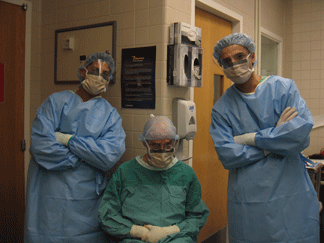The February issue just launched yesterday, and I'll share some free Original Articles with you guys a bit later (you can always go directly to
PRSJournal.com and scroll down to the bottom to see the free offerings for the month, or read this
blog post).
But, I thought that this month's editorial, written by Editor-in-Chief, Dr. Rod Rohrich, and several PS Residents from Yale, would be of great interest to any Pre-Med or Medical Students out there interested in Plastic Surgery.
If you residents know any, please share this article with them!
So You Want to Become a Plastic Surgeon? What You Need to Do and Know to Get into a Plastic Surgery Residency
Nagarkar, Purushottam M.D.; Pulikkottil, Benson M.D.; Patel, Anup M.B.A., M.D.; Rohrich, Rod J. M.D.
Full Text.
PATHWAYS TO PLASTIC SURGERY
It is a truth universally acknowledged that plastic surgery is the most elusive residency in the United States. Unlike most other major surgical subspecialties, there are two well-defined routes to becoming a plastic surgeon—the independent and integrated pathways.1 The integrated pathway consists of 6-year training programs that accept graduating medical students, whereas the independent pathway consists of 3-year training programs that accept graduates of general surgery, neurological surgery, orthopedic surgery, oral and maxillofacial surgery, otolaryngology, and urology residency programs. Both pathways are very competitive—in 2011, only 44 percent of U.S. seniors applying to integrated plastic surgery programs matched into the specialty.2 For comparison, the next lowest match rate belonged to orthopedic surgery, at 77 percent. The competitiveness of the independent pathway has diminished slightly since the training program was lengthened from 2 years to 3 years, but it remains in high demand, with the match rate ranging between 39 and 82 percent over the past 5 years.3,4 Clearly, plastic surgery program directors enjoy a buyer's market. Thus, the obvious question is, What do you need to do to maximize your chances of getting into a great plastic surgery residency? For the answers, we looked at the best available data in the context of the senior author's (R.J.R) 20-year experience chairing a large academic plastic surgery program, and our recent experience in the integrated pathway (P.N. and A.P.), and the independent pathway (B.P.) application process.
THE INTEGRATED PATHWAY
For a medical student applying through the integrated pathway, the first step to becoming a plastic surgeon is being invited for interviews. It goes almost without saying that applicants need to pass some minimum bar just to get their foot in the door. Data published by the National Resident Matching Program2 show that plastic surgery applicants to the integrated pathway (including the ones who did not match) are quite accomplished, with a mean United States Medical Licensing Examination Step 1 score above 240, approximately seven publications each, and a 35 percent Alpha Omega Alpha Honor Society membership rate. As a medical student, the first thing you need to do is to be honest with yourself: Do you have the basic prerequisites to be in the running for an integrated program position? If you are already a fourth-year medical student and you cannot clear this bar, there is likely not enough time to improve your grade point average and United States Medical Licensing Examination Step scores—or to compensate for them with more publications. You may be best served by pursuing the independent pathway. In fact, such a decision demonstrates commendable situational awareness. Remember, the integrated and independent pathways are designed to be equivalent, with the final 3 years of training in each pathway being generally identical.
If you have been invited to some interviews, what do you do next? Many ask who the "ideal" candidate is.5–8 There is a consensus in the literature. The ideal candidate:
* Graduates at the top of his or her class.
* Has an excellent United States Medical Licensing Examination Step 1 score.
* Is a member of the Alpha Omega Alpha Honor Society.
* Has published prolifically.
* Is respected by his or her peers.
* Demonstrates maturity.
* Exhibits leadership qualities.
* Has letters of recommendation from giants in the field.
* Has completed rotations at every program with which he or she interviews.
Unfortunately, there are probably only two candidates each year that fit this bill—everyone else is accomplished but not perfect. Fortunately, program directors know that for every Mozart (who composed his first piece at age 6) there is an Einstein (said to have had speech difficulties as a child). The "imperfect" applicant may end up being just as good a plastic surgeon or even better. For example, the senior author (R.J.R.) confesses that he was an imperfect applicant himself but somehow got into a great plastic surgery residency nevertheless.
So how do you stand out in this crowd of excellent candidates?
Follow the
link to read the rest of the article!
What do you think? Is this good advice to those seeking to get into Plastic Surgery Residency?



